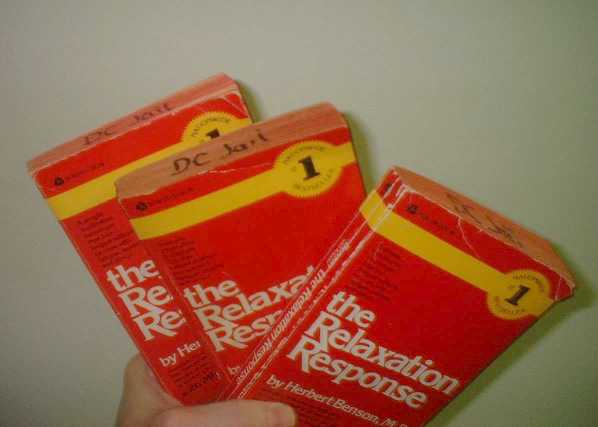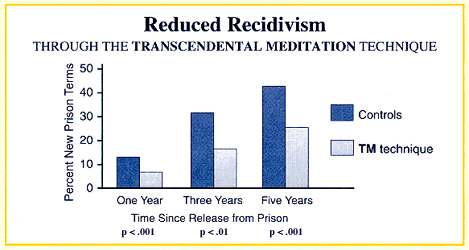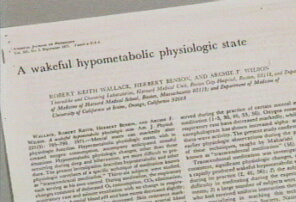Action Plan - Status Report for Supporters
Relaxation Response
Rehabilitation
We are working from "grass roots up" and "top down" to get more knowledge
about the how to elicit the Relaxation Response to those who need it most in
the DC area Departments of Correction. This will help reduce stress in those
most likely to commit crimes, and help to stop crime. Learning to elicit the
Relaxation Response will help prevent crime by helping people release stress
in a peaceful, lawful way before it builds up.
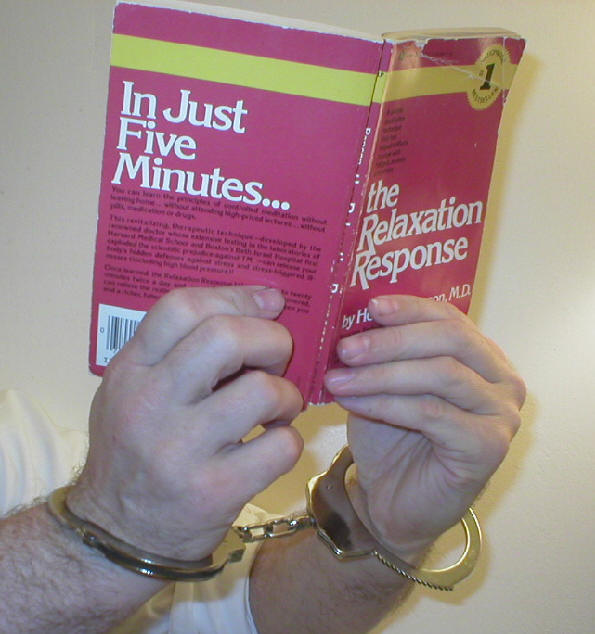 |
Our objectives include:
|
|
|
1. Getting the crimson book in to the hands of inmates We finally were able to get 23 of the crimson books in to jail, not many, but it is a start. Crimson is such an appropriate color, both for the book's beginnings at Harvard, and its being the color of the heart. We have ordered over 50 books from http://Amazon.com for this project. Our original idea was to simply donate the RR books to the DC Jail Library, but this proved to be naive. Even if they got on the shelves, the inmates have to jump through so many hoops, and wait weeks, to get even a few hours in the Library. So, it is more effective to get the books to the cells, than to get the prisoners to the books. But this is not easy. Books are seen as a way that people might smuggle contraband, such as cigarettes and cash (or worse), in to the jail. Last April, a gun was smuggled in to DC jail and 3 people were shot. After this embarrassment, they are reluctant to let anything in that might conceivably contain a weapon. As it turned out, the best way to get the Relaxation Response book in the hands of DC inmates was to take the direct approach - give them to prisoners who were scheduled to go in to jail. Sometimes judges allow those with jobs and dependants to go in on weekend sentences. Sometimes guards will allow a book to enter with a "weekender", after a thorough search. A few probation officers have been helpful in facilitating this. The Visitors Service Center, a nonprofit initiative to help those in prison, has also been helpful in this effort. http://VSCDCJails.org There are very few books in the cell blocks, even soft cover. No wonder that incarceration is not the rehabilitative or educational experience it is supposed to be. The DC Department of Corrections and the profit making http://www.CorrectionsCorp.com have the name "corrections": in their name and the motto ""Excellence in Corrections" primarily for show. They earn money in proportion to the number of inmates they house, and trade stock on the NY Stock Exchange (C. They need to realize that true corrections comes from within. The books will hopefully serve a "long
sentence" as they are passed from cell to cell, and change the lives of
many inmates. They certainly have plenty of time to read the book and
practice meditation. |
 |
2. Teaching RR at Anger Management seminars for probationers
I sat in on "Anger Management" classes, and found them to be little more than a discussion group or "rap session." I gave a copy of the RR book to the instructor (facilitator) and offered to give a free class at one of the sessions to make it more instructive. I am giving the books to Probation Officers, who should become more knowledgeable about what causes stress, and criminal tendencies. Corrections Officers should know how to help people self-correct. They may never have thought about the impact of diet and stress on those they supervise. They should know how to check meditation. |
 |
3. Including RR in the CCA Life Skills class
DC has 2 jails, one run by the government, and one run by Corrections Corporation of America. CCA at least offers some
classes, such s Life Skills. I gave books to the instructor
Mrs. Butler, who is very supportive of the project. She has
been working for years to get more training for inmates.
|
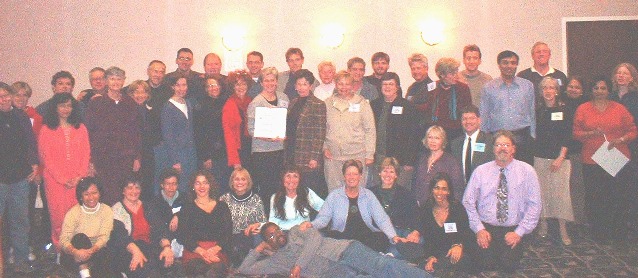
|
4. Inviting DC Jail doctors to attend MBMI seminars
The medical staff at the DC jail are those who may appreciate the Relaxation Response the most.
Would it be possible for me one of them to attend your seminar?
I will see if I can come up with some scholarship money for this.
When they return, the DC jail doctors and nurses could distribute
education instead of just medication. They are pretty much
pharmacologically oriented now - just giving drugs out to the
prisoners, and sometimes physical treatment/surgery. So
they really need the "3rd leg of the stool."
Out of boredom some inmates may fake illnesses just to get
drugs. The needless taking of drugs may build dependencies
that persist when they are finally released..
|
|
|
5. Teaching corrections officers on how to teach RR
Judges and Probation Officers will listen to their peers. So, we are
sponsoring a seminar, and planning to fly one of the judges and probation
officers to come from St. Louis Missouri to give a talk about the success
they have had using TM in probations.
|
|
|
6. Educating judges and prosecutors in the
value of RR based sentences The above seminar will also be promoted to all Judges and prosecutors in the DC, Maryland, and Virginia area. Judge David Mason was the first to
stick his neck out, and make TM training a condition of release. They have
the most successful program so far, in teaching the elicitation of the
Relaxation Response. |
 |
7. Establish a training program similar
the TM one in St. Louis I am working with Farrokh Ankelsaria on this effort and hosting his web site. http://EnlightenedSentencing.org and TranscendentalStressManagement.org
|
|
|
8. More
Scientific Research Projects Start a Relaxation Response Research Foundation to encourage graduate students to do their masters thesis or PhD dissertation projects on controlled studies using training in elicitation of the Relaxation Response as an intervention, similar to the following
In this study, 259 male felon parolees of the California Department of Connections who learned the Transcendental Meditation technique while in prison had fewer new prison terms and more favorable parole outcomes each year over a five-year period after release compared to carefully matched controls. The Transcendental Meditation program was shown to significantly reduce recidivism during a period of six months to six years after parole, whereas prison education, vocational training, and psychotherapy did not consistently reduce recidivism.
References:
|
| 8. Learning from similar programs, and
networking when appropriate Check out and network with
similar programs |



